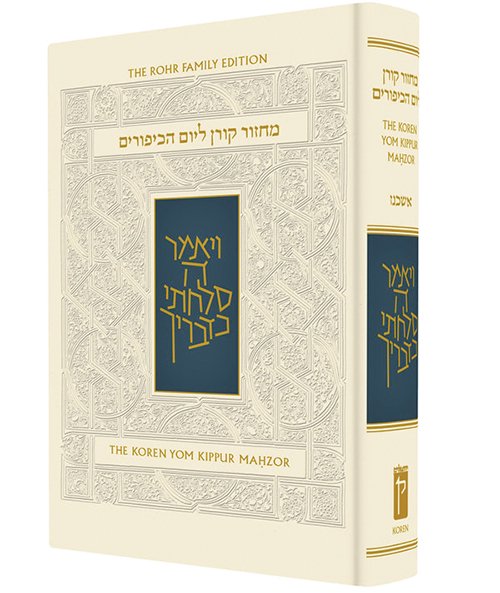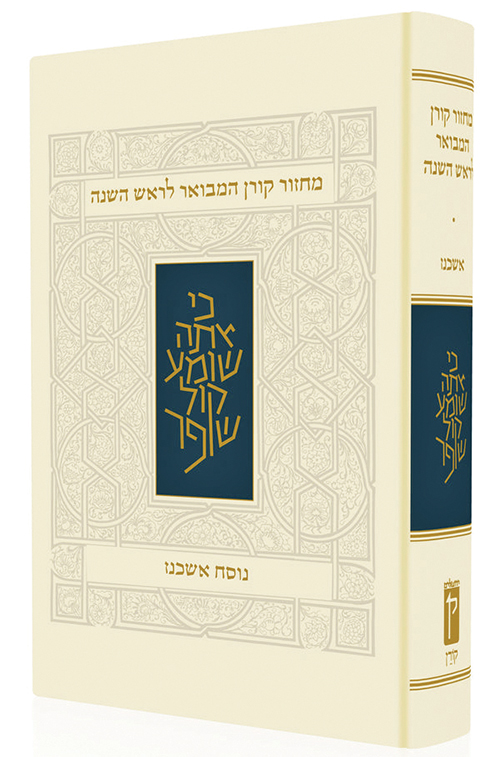
During Rosh Hashanah and Yom Kippur, Jewish people around the globe will spend many hours in prayer, reading hundreds of pages of texts. Whether an individual is opening a Mahzor for the first time or has been attending services for decades, the texts often feel unrelatable and difficult to decipher. In 2011, Koren Publishers Jerusalem unveiled the Koren Sacks Mahzor with the aim of making the High Holiday prayers more accessible and meaningful to the English-speaking worshiper.
The Koren Sacks Mahzor, which has separate volumes for Rosh Hashanah and Yom Kippur, contains a modern translation and commentary by the late Chief Rabbi Lord Jonathan Sacks, as well as a lengthy introduction with ideas and insights that speak to a broad audience, from the worshiper that is new to prayer to the seasoned scholar.
In his introduction to the Koren Rosh Hashana Mahzor, Rabbi Sacks explains the rich meaning of the holiday and offers guidance on how its observance can transform our lives. He examines the themes associated with the Jewish New Year including the anniversary of creation, the kingship and coronation of God, exile and return, as well as the concept of repentance, which he explains unites past, present and future. “Teshuva sensitizes us to the full significance of time,” he writes. “Teshuva tells us that our past does not determine our future. We can change. We can act differently next time than last. If anything, our future determines our past. Our determination to grow as human beings—our commitment to a more faithful, sensitive, decent life in the year to come—gives us the courage and honesty to face our past and admit its shortcomings.”
Rabbi Sacks writes in his introduction to The Koren Yom Kippur Mahzor that this holy day is about, “What it means to be me, this unique person that I am.” He continues, “It makes us ask, ‘What have I done with my life? Whom have I hurt or harmed? How have I behaved? What have I done with God’s greatest gift, life itself? What have I lived for and what will I be remembered for?’” He delves into the history of forgiveness, drawing from wisdom of secular philosophers and historians as well as from religious sources, and provides fresh perspective on other themes and pivotal prayers of the holiday. He closes with an inspiring message that gives the worshiper greater understanding behind the rituals and prayers of the day.
The commentary alongside the prayers draws from biblical and classical sources as well as Rabbi Sacks’ own interpretation. Each stanza of the Yom Kippur vidui or confession, for example, offers an explanation on the nature of each sin we are confessing with very relatable examples. Rabbi Sacks explains that the sin we have committed “b’vitui sfataim” or “by utterance of our lips” refers to our insensitive, tactless or callous speech. “We said things without thinking of the impact our words would have on others,” he writes. The sin we have committed “bivlei da’at” or “unwittingly” is explained as a transgression that was carried out without the knowledge we should have had. “We did not know it was forbidden or illegal or unethical because we did not study, learn or inquire. Perhaps, deep down, we did not want to know.”

The formatting and style of the Mahzor are also intentional. Rather than blocks of long paragraphs, each page contains shorter texts that are separated by line and paragraph breaks, which draw the worshiper’s attention to focal words and themes contained in the text and also force the reader to slow down during recitation of the prayers. Great detail is also placed on the aesthetics of the Mahzor, from the typography to the book binding to the cover design.
Koren Spokesperson Alex Drucker shared that the Mahzor reflects Koren’s philosophy to produce Jewish materials that are “accurate but also impeccably designed.” The intentionality of the Mahzor’s design, coupled with its content that supplements the Hebrew texts, he said, resulted in a tool that enables individuals to enhance their prayer experience, and not just aim to rush through the words.
In addition to the Ashkenazi Mahzor, Koren has also produced Mahzorim in Nusah Sepharad, Edot HaMizrah and Minhag Anglia and with Moroccan liturgy, representing the publisher’s commitment to making the rich body of Jewish texts accessible to an expanding audience.
Alisa Bodner is a Fair Lawn native who immigrated to Israel a decade ago. She is a nonprofit management professional who enjoys writing in her free time.










